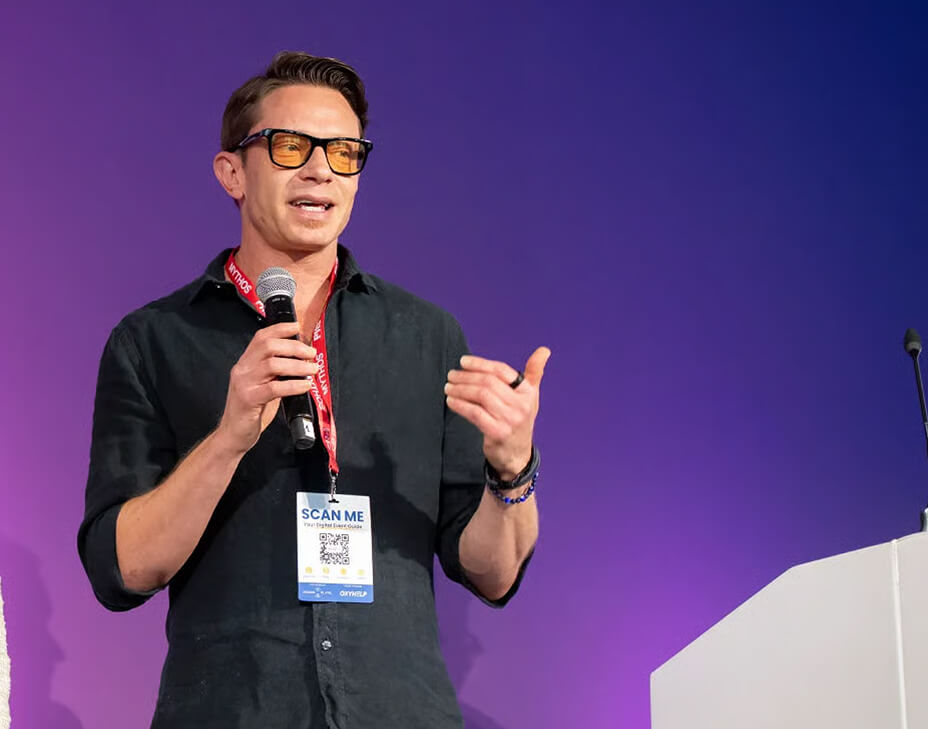The no bull**it approach to health when you have a busy lifestyle
Today, we’re introducing you to Dr. Natko Beck, the most popular Croatian doctor on social media. He is a radiologist that won the hearts of Croatians during the pandemic with his positive outlook, willingness to help, a strong sense of justice and a great sense of humour. Find out his number one advice for all his patients in the interview below.
Natko, how did you discover GlycanAge, and what made you take the first test?
Well, first of all, I like being healthy, so I try to invest both time and money in my wellbeing and health. Seeing how I don’t have as much time as I did before, I was looking for a readily available solution on the health optimisation market that can help me track my health.
I’m a huge fan of biofeedback and I actually worked in neurofeedback for a couple of years. I just love everything that gives you a response to something that you don’t know about your body. That was my whole initiative to become a medical doctor - to find out everything about the human body and how my body works.
Once you get biofeedback from your body, you can make the needed intervention and keep an eye out for changes. So basically, with all that, you can see why I was drawn to GlycanAge. I like new technology and new applications in science.
We can see why GlycanAge was the perfect fit for you. That leads us to the next question, did you experience any lifestyle event that was a turning point for you?
I have a podcast and one of my first guests was professor Lauc so we talked a lot about glycans, their role in our bodies and how GlycanAge tests are conducted. I got to ask him firsthand about the whole process and after the interview, I decided to get tested. Tests like these are what I’m all about. I wanted to get an approximate age, a number I can work with and not some arbitrary number on a scale some brand manufactured.
When my results came back, I was surprised to learn that my GlycanAge was 5 years below my chronological age. I definitely want to repeat the test to see how almost 2 years of this global pandemic affected my life.
Seeing how your GlycanAge result was great, did you implement any changes after the test?
If I’m being completely honest, I’m a bit of a lazy person. That’s why I wanted to get the blood test done since it’s so easy and the results cover a lot of issues. Once I saw that everything was ok, I didn’t really implement any changes.
I’m 40 and my GlycanAge is 35 so I’m just at the border of being statistically relevant. I said to myself, ok, it’s not the worst-case scenario, since I’m right where I should be. I was already trying to live as healthily as I could, given the circumstances.
I’m not a big fan of sudden changes, I like to implement things slowly. For example, when I first met my wife, she started implementing healthier options in my life and a year later, I was living in a much healthier way. However, if she had implemented all the changes in a day, I would’ve quickly fallen off the wagon.
One thing that I would like to mention is that I stopped drinking coffee 2 days ago because I felt like it didn’t do anything good for me. I would always drink it with milk and sugar and over time it felt like I was only drinking it for the add ons. I don’t think that coffee is bad by any means, but I wasn’t getting anything good out of it.
Basically, I believe in taking baby steps. I know a lot of health gurus on social media will talk a big game about cutting things out of your diet and lifestyle overnight but I think that leads you straight to failure.
I already know that going cold turkey doesn’t work for me so I’m not trying to be something I’m not. I used to sleep a lot less due to my work in the neuro research department. When you’re in a place like that, with a crazy schedule, you often don’t make the best decisions for your body. I soon started to feel burnt out on a psychical and psychological level and after that, I implemented a few changes.
Do you have any advice for people who are currently living like you used to? Someone who has a very busy schedule and doesn’t have any time to spare?
Well, living healthy can mean a lot of different things to a lot of different people. Sometimes having a busy lifestyle makes you go intermittent fasting simply because you don’t have a chance to eat. Whether that’s healthy or not is up for debate. Science hasn’t given us an answer yet.
I definitely try not to eat too much. I think that is the biggest trap for people. Because when you’re in the middle of a project and stakes are high, your brain tends to ask for heavy sustenance like junk food and that is a lot of people’s kryptonite.
In situations like these, you need to trick your body into eating something healthy even if you think you’re not in the mood. As soon as you start eating a stew or something like that, you’ll feel the blessing from inside because it’s the best thing for you in that situation.

What do you think are some of the biggest misconceptions people have about healthy living?
The worst thing is to take your health for granted because you’re living a healthy lifestyle. You’re not excluded from disease, you’re just less likely to develop it. Your body will have a better chance of fighting off cardiovascular disease, but a good diet and fitness routine is not a get-out-of-jail-free card.
Secondly, people want to see changes and unless you’re playing some kind of a sport, it’s likely you won’t see any big changes. You can monitor muscle and fat, but the biggest changes are the ones you can’t see.
You’ll be more energized once you implement healthy habits but you won’t become Superman. The way you feel while living healthily is the way you’re supposed to feel. You’ll still get tired and stressed out. You just need to listen to your body and react in an appropriate way.
Lastly, a lot of people take their health to the extreme and restrict themselves in every way possible. I think those people are suffering inside and instead of dealing with the trauma and psychological issues, they go to the gym and push themselves to the breaking point.
If you’re choosing not to have normal social connections because of your lifestyle, then it’s not a healthy lifestyle, it’s a burden!
How can people track their progress in a healthy way?
I for one don’t weigh myself on a regular basis. I’ll jump on the scale every once in a while to see how I’m doing, but I mostly focus on how I feel. I’m curious to see how my Glycange changes with time. That’s going to be an interesting thing to monitor. I wonder what my results will look like in 10 or even 20 years.
Let’s pencil in an interview for 10 years from now and see what changed! But for now, do you have any self-care tips that you can share with us?
I don’t think I have any, to be honest. Gurus on the Internet will tell you to stick to some sort of routine. For me, that doesn’t work, because I’m a chaotic person and I never know what the next day brings.
I work with people and sometimes I see 20 to 40 people a day and I just don’t get a chance to eat. My best tip for a situation like this is to rather skip a bad meal than have a bad meal. I’m not sure if that’s a good tip and don’t get me wrong I definitely indulge myself sometimes. But for the most part, I try to drink only water and tea and my daughter and dog act as my personal trainers.
Now that I’m thinking of it, my biggest advice is to listen to your wife. That’s the tip I give to my patients all the time. Wives want what’s best for their husbands and most of them are already leading healthy lives.
The last piece of advice is - you don’t have to win every debate. Reduce your stress by avoiding debates with people who are not worth it. In summary, I would say listening to my wife is 60% of my healthy lifestyle and not engaging in trivial arguments makes up 20%. So just by 2 interventions, my life got 80% healthier.


